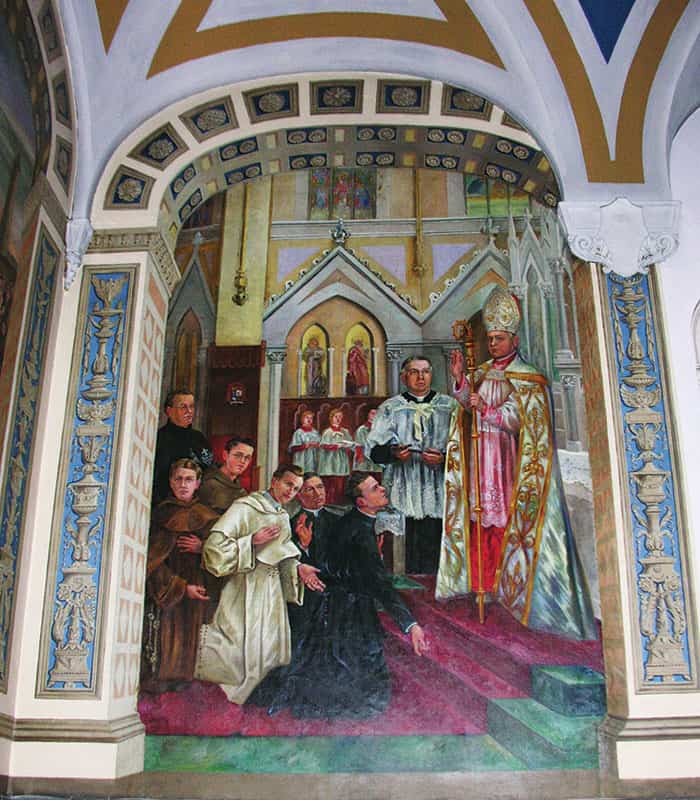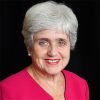In honor of the founding of the Maryknoll Fathers and Brothers, June 29, 1911, we share this centenary article from 2011 on Bishop James A. Walsh, who with Father Thomas F. Price cofounded the mission society.
At St. Paul’s Church in Cambridge, where James A. Walsh grew up in the shadow of Harvard University, parochial vicar Father James Savage says, “We’d like to think our parish influenced him.” He points to a mural on the church wall, which attests to the strong mission spirit that pervaded St. Paul’s. The mural symbolically depicts the mission-sending ceremony of six young men connected with the parish who all became leaders in the missionary movement—at home and abroad. James A. Walsh is one of them. Recalling his earliest contact with foreign mission, Walsh credited “an old German priest in the Jesuit church where I went to Sunday School, who interested us in the little waifs of China.” Young Walsh went around and collected one cent each from 12 people to help the poor in China.
If St. Paul’s planted the mission seed in Walsh, it was surely nourished at St. John’s Seminary in Brighton, where he studied for the diocesan priesthood. “The seminary was always mission-minded,” Bishop Arthur Kennedy, the rector, tells visitors as he leads them through the halls Walsh walked as a student. Kennedy attributes that spirit to the French Sulpician priests who staffed the Brighton seminary and often invited members of their order to speak to the students about their mission work in the Far East and Africa. James A. Walsh took their stories to heart and became director of Academia, the seminary’s mission club that helped raise interest in and funds for the missions.
“When Archbishop John Williams ordained James Anthony Walsh to the priesthood on May 20, 1892, he raised to the holy orders a young man ripe in mind and heart and soul for a life of devotion to the Church in non-Christian lands,” wrote Cardinal Richard Cushing, who more than 20 years later followed Walsh into St. John’s Seminary and would himself found a missionary organization, the St. James Society, that sends diocesan priests from English-speaking countries to serve in Latin America for five-year renewable terms and then return to enliven their own dioceses. Some 300 Boston priests have been St. James Society members.
Cushing and Walsh would no doubt rejoice to see how their vision has come full circle in their seminary today. “We have 80 students, not all U.S.-born,” says Kennedy. “They come from 14 different countries. In addition, eight Vietnamese students are training to become priests for their homeland. Cross-cultural understanding occurs naturally here as students become friends.”
For Walsh, becoming Boston’s director of the Society for the Propagation of the Faith (SPF) not only increased his cross-cultural understanding but also his desire to give his fellow Americans worldwide hearts. To that end, with the help of another Bostonian, Mary Josephine Rogers, he began publishing a mission magazine, The Field Afar.
Maureen Heil, director of programs and development for the SPF in Boston, sees the connection between the vision of Walsh and Pauline Jaricot, who founded the SPF in France in 1822. “Both Pauline and Father Walsh believed that getting involved in overseas mission would enliven the faith back home,” says Heil. Today, she adds, SPF is still dedicated to the worldwide spread of the Gospel, mainly through new forms of media such as the web.

Cardinal Seán O’Malley, spiritual leader of Boston’s 2 million Catholics, is justly proud of their many mission outreach efforts. He cites their response to the Jan. 2010 earthquake in Haiti. “In my latest trips to Haiti, I was amazed to see how many local parishes have ties to agencies and parishes there,” he says, adding that Boston has the third largest population of Haitians of all U.S. cities, after Brooklyn and Miami.
Boston sprang into action immediately following the quake. Parishes collected $2 million in relief aid. Medical teams traveled to Haiti to train people to do long-term care.
Tiziana Dearing, former president of Catholic Charities in Boston, reports that the agency opened 11 free clinics to serve Haitians who were in Boston in January. “Catholic Charities has 750 employees,” Dearing says, “but we couldn’t do the work we do to catch people when they’re falling without some 2,000 volunteers.” They come from parishes like St. Cecilia’s in downtown Boston, where pastor Father John Unni says many parishioners see service as their calling. Mark Lippolt is one of them. Every other Sunday morning Lippolt and a group of fellow parishioners can be found collecting donated food from a local merchant and bringing it to Catholic Charities Haitian Multi-Service Center in Dorchester, where Beth Chambers, director of community service, comes in on her day off to receive it. During the week she distributes the food to all who need it, Haitians and non-Haitians alike. Several parishioners from St. Cecilia’s have traveled to Haiti with their pastor to deliver their love and concern in person.
University students, who make up a quarter of a million of Boston’s residents, get countless opportunities for mission service at schools like Jesuit-run Boston College. BC’s Arrupe International Program, named for the former Jesuit superior general known for linking faith and social justice, aims to do just that. Listening to BC students Dan Kennedy and Beth Glauber talking about their recent short-term service trips, it’s obvious the Arrupe Center is accomplishing its goal. Kennedy, who helped build homes in Belize City, says, “I came to understand how the world suffers, but we are not devoid of hope. It’s all about the choices we make, and we can make a difference.” Glauber, who served as a student leader on a trip to the U.S./Mexico border, says, “I learned that most migrants don’t want to leave their home. I want to convey the message that they are not coming with drugs and guns but to support their families.”
Kelly Sardon-Garrity, who directs the Arrupe program, says, “It’s fulfilling knowing that these bright, compassionate people will give service to the world because of their connection with people who suffer.”
Back at St. Paul’s in Cambridge, where most of today’s parishioners are Harvard University students, Father Savage says, “In my homilies, I always allude to the mural with Father Walsh and the other missioners and I tell students, ‘Take that spirit into your own lives.’ It was the source and foundation of America’s greatest mission society.”
Featured Image: As director of Society for Propagation of the Faith in Boston, Father James A. Walsh worked to get U.S. Catholics interested in sharing the Gospel in fields afar. (Maryknoll Mission Archives)

